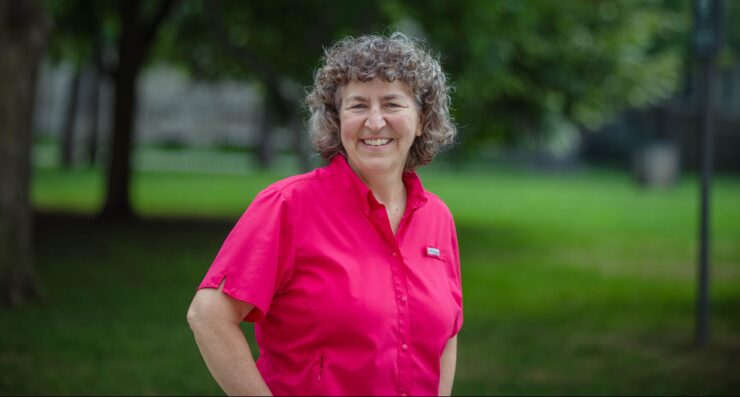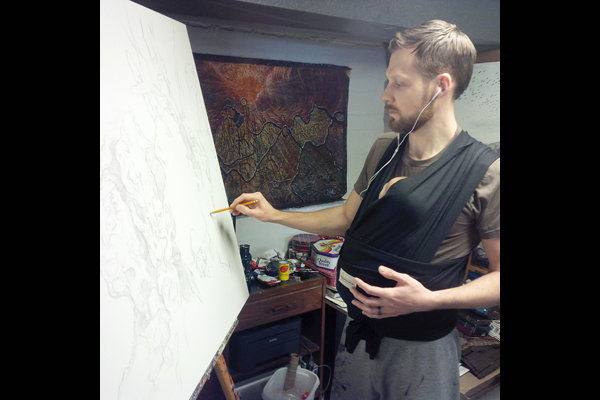If you’ve spent any time at the University of Ottawa over the past 25 years, chances are you’ve had some kind of interaction with Leslie Weir, the university librarian from 2003 to 2018.
Since joining the university in 1992, Weir has grown into an institution on campus herself, spearheading monumental changes to the university’s Wi-Fi systems, websites, and, of course, its library. She’s also cross-appointed to the School of Information Studies at the university.
But come August, Weir won’t just be remembered as one of the U of O’s librarians — she’ll go down in history as one of Canada’s too.
“It is pretty exciting, it’s sort of returning to something that’s new,” Weir said of her homecoming. Before coming to the U of O Weir worked in the National Library of Canada, which eventually became Library and Archives Canada after it merged with the National Archives of Canada in 2004.
Truth be told, Weir’s love for libraries goes much deeper than that.
A childhood of libraries
It all starts back in Montreal, where Weir was born and raised with two sisters and a brother. Throughout childhood, trips to the Fraser-Hickson free library in Notre Dame de Grace were the norm.
“(My mother) took us there every week for us to take out books from the library … we were a family where there was always a lot of books in the house,” Weir said, adding her mother was a librarian too. “Public libraries were part of my life in my childhood.”
After high school, Weir set her sights on Concordia University to study Canadian history. Outside of class, she picked up a part-time job in Côte Saint-Luc Public Library.
“That library was open 365 days of the year, from 10 a.m. to 10 p.m. … it was very much a community-based public library,” she remembers. The late Elanor London, former chief librarian at Côte Saint-Luc who died in 2017, influenced Weir’s philosophy as a librarian, she said.
“(She) was one of the first public librarians to stop the shushing and to want the library the library to be quiet,” Weir said. “She wanted it to be full of life, conversations, debate and play.”
After graduation she took a full-time job at the same library for a year, solidifying her plans to continue down the path towards becoming a librarian. That path took her to McGill University, where she completed a masters of library and information sciences.
Weir worked at the historic McGill University library during her studies. She got her first chance to work with government documents from every corner of the globe there, foreshadowing career leaps that were soon to come.
“When you’re cataloguing, you don’t just look at the date of publication and the title,” Weir said. “You flick through the documents, you explore.”
From Statistics Canada the National Library of Canada
With her degree from McGill University in hand, Weir had the opportunity to move to Ottawa, where her father was from (her parents, ironically, met at McGill University).
Weir took a job as a librarian at Statistics Canada where she worked with pretty much anything that was not a government document, from sociological studies on gender and health to polls, community studies, and books on business.
She joined Statistics Canada at an integral time: the federal department was just beginning to automate cataloguing, a major shift in archival and librarian work she got to be a part of.
That experience helped her transition to a job at the National Library of Canada, where she was part of the team managing the automation of the nation’s library.
“It was transforming libraries, from places that stored things for people to be able to borrow, to being able to make all of their collections accessible and discoverable,” Weir said, which started with an open online catalogue.
“(Libraries are) early adopters of any technology that supports discoverability and findability of information.”
Returning to university libraries
Weir carried that doctrine with her to the U of O’s library, where she took a job in 1992. One of her many tasks? Focusing the plethora of functions of the library into a single system, which was no easy feat.
At the same time, Weir pushed for the implementation of WiFi in the library (the first spot on campus it would be available), which was an equally difficult task.
“To be honest, it was a fight, because WiFi was a huge security risk (at that time), and so the IT people were very reticent to move into WiFi,” Weir said. The two departments eventually put their heads together and implemented wireless internet in the library in the late 1990s.
From there “it moved like wildfire around campus,” Weir said, who was the assistant university librarian at the time. In the mid-’90s, she also helped develop the university’s first website.
“Then we started moving into the electronic stuff in a big way,” Weir recalled.
That trend was marked by the university’s move to buy digital books first and their print siblings second in the early 2000s, a decision that’s probably saved your GPA on more than a few last minute essays.
“Students could access stuff from home, and they can access it 24 hours a day,” Weir said of the importance of the shift. “It allowed students to manage and organize their own time, and then get what they need to do their work when they need it.”
Weir also linked up with other university libraries throughout the province to launch Scholars Portal in 2002, a central system campus libraries in Ontario could use to share electronic journals and books.
Similarly, the U of O library collaborated with universities across the province to unveil what’s now called the Canada Research Knowledge Network, a similar system but Canada-wide in scope.
University librarian, 2003-18
In 2003 Weir officially became the university librarian after working as the acting university librarian in 2002.
“There’s an incredible team there, the people that work in that library love what they do, and they care so much about the students and the faculty members,” Weir said. “They will move mountains to support our students and faculty and in what they’re trying to accomplish.”
During her 15 years in the role, Weir saw a lot. Some of her accomplishments include “radically” increasing student space, renovating Morisset and the Health Sciences libraries, introducing virtual chats with library staff, creating an open institutional depository for research taking place at the U of O, and, to top it off, being a part of the team to develop the recently opened Learning Crossroads, where the library has 40,000 square feet.
Inside Learning Crossroads, Weir said the team is working on developing new programming centred around digital services, including virtual reality.
“I think we weathered and in fact embraced the transition from print to digital and the expansion of the university from 24,000 to 44,000 students in a way that really served the university and continues to,” Weir said.
Weir stepped back from her role as university librarian after an impressive three-term run in 2018. She praises the work of current university librarian Talia Chung, who started her five-year term last September.
“She’s an incredible new leader,” Weir said, highlighting how Chung helped spearhead the development of the Canadian Archives of Women in STEM. “I think she’ll take the library to even greater heights.”
Weir’s special homecoming
Come Aug. 30, Weir will circle back to one of the institutions where she launched her career as she becomes librarian and archivist of Canada for a four-year term. She’ll become the first woman to hold the role.
Weir said she’s excited to take on the new role and praised the recent initiatives of the federal institution, including the digitization of military records, working with Indigenous communities to “decolonize libraries” and help preserve Indigenous languages, along with the collection of censuses all way back to the 17th century, among other things.
“I can leverage what I’ve learned at the University of Ottawa because I’m a lifelong learner,” Weir said. “I’m looking forward to taking my skills and expertise and applying them to this great new opportunity.”
The integral task of Library and Archives Canada to preserve the Canadian government’s record isn’t lost on Weir.
“How do you have a civil society if you don’t have your government record?”
While Weir said she’s still shaping her plans for her time at the head of Library and Archives Canada, she said she’s excited to put her background in IT to work.
“I’m really interested in how you can make the virtual experience more relevant and more exciting and more interactive … because people today are really interested in not just looking at things they’re interested in playing with them, and using them and morphing them into something new and different,” she said.
In the end, Weir said she feels she’ll always have a home at the U of O, especially in its rows of bookshelves.
“My time at the University of Ottawa has been very important to me and I may be leaving, but I’ll always be a part of the university family, no question.”





